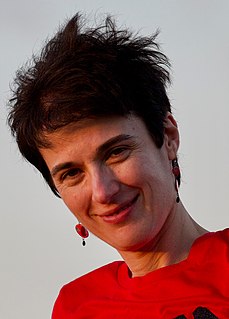Monica Sin-Ling Lam is an American computer scientist. She is a professor in the Computer Science Department at Stanford University.
Judith F. Kroll is a Distinguished Professor of Language Science at University of California, Irvine. She specializes in psycholinguistics, focusing on second language acquisition and bilingual language processing. With Randi Martin and Suparna Rajaram, Kroll co-founded the organization Women in Cognitive Science in 2001. She is a Fellow of the American Association for the Advancement of Science (AAAS), the American Psychological Association (APA), the Psychonomic Society, the Society of Experimental Psychologists, and the Association for Psychological Science (APS).
Chung-Chieh Jay Kuo is a Taiwanese electrical engineer and the director of the Multimedia Communications Lab as well as distinguished professor of electrical engineering and computer science at the University of Southern California. He is a specialist in multimedia signal processing, video coding, video quality assessment, machine learning and wireless communication.

Fei-Fei Li is an American computer scientist. She is the Sequoia Capital Professor of Computer Science at Stanford University. Li is a Co-Director of the Stanford Institute for Human-Centered Artificial Intelligence, and a Co-Director of the Stanford Vision and Learning Lab. She served as the director of the Stanford Artificial Intelligence Laboratory (SAIL) from 2013 to 2018.
Li Sheng, is a professor at the School of Computer Science and Engineering, Harbin Institute of Technology (HIT), China. He began his research on Chinese-English machine translation in 1985, making himself one of the earliest Chinese scholars in this field. After that, he pursued in vast topics of natural language processing, including machine translation, information retrieval, question answering and applied artificial intelligence. He was the final review committee member for computer area in NSF China.
Rada Mihalcea is a professor of computer science and engineering at the University of Michigan. Her research focuses on natural language processing, multimodal processing, and computational social science.
Craige Roberts is an American linguist, known for her work on pragmatics and formal semantics.

Paola Velardi is a full professor of computer science at Sapienza University in Rome, Italy. Her research encompasses natural language processing, machine learning, business intelligence and semantic web, web information extraction in particular. Velardi is one of the hundred female scientists included in the database "100esperte.it". This online, open database champions the recognition of top-rated female scientists in Science, Technology, Engineering and Mathematics (STEM) areas.
Mirella Lapata FRSE is a computer scientist and Professor in the School of Informatics at the University of Edinburgh. Working on the general problem of extracting semantic information from large bodies of text, Lapata develops computer algorithms and models in the field of natural language processing (NLP).
Animashree (Anima) Anandkumar is the Bren Professor of Computing at California Institute of Technology. She is a director of Machine Learning research at NVIDIA. Her research considers tensor-algebraic methods, deep learning and non-convex problems.
Emily Mower Provost is an associate professor of computer science at the University of Michigan. She directs the Computational Human-Centered Analysis and Integration (CHAI) Laboratory.
Xia Zhou is an associate professor in the Department of Computer Science at Dartmouth College. Her current research centers on light. She co-directs the DartNets Lab and the Dartmouth Reality and Robotics Lab (RLab). She was a visiting faculty in National Taiwan University from December 2016 to February 2017, and in University of Cambridge from April 2017 to June 2017.
Bonnie Jean Dorr is an American computer scientist specializing in natural language processing and machine translation. She is a professor emerita of computer science and linguistics at the University of Maryland, College Park, an associate director and senior research scientist at the Florida Institute for Human and Machine Cognition, and the former president of the Association for Computational Linguistics.
Kathleen R. Johnson is an American member of the Grand Traverse Band of Ottawa and Chippewa Indians who is a geologist and paleoclimatologist. Her research focuses on reconstructing past climate change with speleothems, on active cave monitoring to understand the interaction of climate with speleotherm geochemistry, and analyzes climate and paleoclimate data to investigate natural climate variability. She earned a PhD from the University of California Berkeley in 2004 and is an associate professor at the University of California Irvine.

Mihaela van der Schaar is the John Humphrey Plummer Professor of Machine Learning, AI, and Medicine at the University of Cambridge, where she is director of the Cambridge Centre for AI in Medicine (CCAIM), and a Chancellor's Professor of Electrical and Computer Engineering at the University of California, Los Angeles.
Heng Ji is a computer scientist who works on information extraction and natural language processing. She is well-known for her work on joined named entity recognition and relation extraction, as well as for her work on cross-document event extraction. She has been coordinating the popular NIST TAC Knowledge Base Population task since 2010. She has been recognised as one of AI's 10 to watch by IEEE Intelligent Systems in 2013, and has won multiple awards, including a NSF Career Award in 2009, Google Research awards in 2009 and 2014, and an IBM Watson Faculty Award in 2012.
Mona Talat Diab is a computer science professor at George Washington University and a research scientist with Facebook AI. Her research focuses on natural language processing, computational linguistics, cross lingual/multilingual processing, computational socio-pragmatics, Arabic language processing, and applied machine learning.
Jessica Hullman is a computer scientist and the Ginni Rometty associate professor of Computer Science at Northwestern University. She is known for her research in Information visualization.
Ani Nenkova is Principal Scientist at Adobe Research, currently on leave from her position as an Associate Professor of Computer and Information Science at the University of Pennsylvania. Her research focuses on computational linguistics and artificial intelligence, with an emphasis on developing computational methods for analysis of text quality and style, discourse, affect recognition, and summarization.
Mi Zhang is a computer scientist who is currently an associate professor and the director of Machine Learning Systems and AIoT Lab in the Department of Computer Science and Engineering at The Ohio State University. He is best known for his research in Artificial Intelligence of Things (AIoT), edge AI, machine learning systems, and mobile health.


